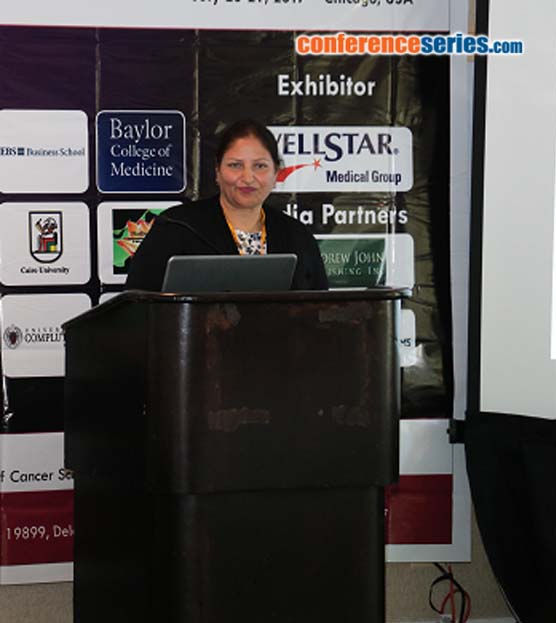
Nabeela Shami
Lahore Medical & Dental College, Pakistan
Title: Early secondary cytoreduction may be associated with better surgical outcomes in recurrent epithelial ovarian cancer
Biography
Biography: Nabeela Shami
Abstract
Background: Secondary cytoreductive surgery should be considered in all patients with recurrent epithelial ovarian cancer as optimal secondary cytoreduction has been associated with improved survival, irrespective of duration of disease free interval (DFI). A good performance status, initial optimal cytoreduction and absence of ascities are suggestive of increased odds of optimal secondary cytoreduction. Extent of disease is also a major determinant as patients with smaller disease burden are more likely to achieve optimal cytoreduction. Consequently, delay in secondary cytoreduction may reduce the number of patients who can undergo optimal cytoreduction. As yet, there is no consensus in literature regarding the optimum timing of secondary cytoreduction in patients with recurrent disease. The present series aims to document the success rate of optimal secondary cytoreduction in patients based on their DFI.
Methods: Patients who had undergone primary cytoreductive surgery, had received chemotherapy and showed a complete response, but subsequently presented with disease recurrence, were included. Evidence of measurable disease on imaging study was required. Abdomen was opened with a vertical incision, ascitic fluid/washings were removed, maximal cytoreduction was performed with a goal to reduce the tumor to <1 cm diameter. All patients were given gemcitabine 1250 mg/m2 on day 1 and 8 and cisplatin 70 mg/m2 on day 1 only. Cycles were repeated every three weeks. RECIST was used for response evaluation.
Result: One hundred and eight patients were enrolled from December 1998 to December 2013. Median age was 52 years (range 40-68). Seventy two patients had previously received cyclophosphamide and cisplatin while 36 had received paclitaxel and carboplatin. The disease free interval was less than 6 months in 32 patients, more than 6 months in 50 patients and more than 12 months in 26 patients. Optimal cytoreduction was achieved in 42 (38.8%) patient only and included 15, 20 and 7 patients with DFI of <6 months, >6 months and >12 months, respectively. Gut injury was seen in 8 (7.4%) and bladder perforation in 8 (7.4%). Among 42 patients with optimal cytoreduction, 20 had a CR while 22 showed a PR with chemotherapy whereas in patients with sub-optimal surgery CR was seen in 14 patients, PR in 20 and less than PR in 32 patients.
Conclusion: Secondary cytoreduction and postoperative second line chemotherapy with gemcitabine and cisplatin is a reasonable treatment option for patients with recurrent epithelial ovarian cancer. Early cytoreduction seems to confer a favorable surgical outcome. The present data suggests that early detection and surgical intervention of recurrent disease may result in increased response rates. Further studies are needed to validate our findings in larger patient cohorts.
Speaker Presentations
Speaker PPTs Click Here

